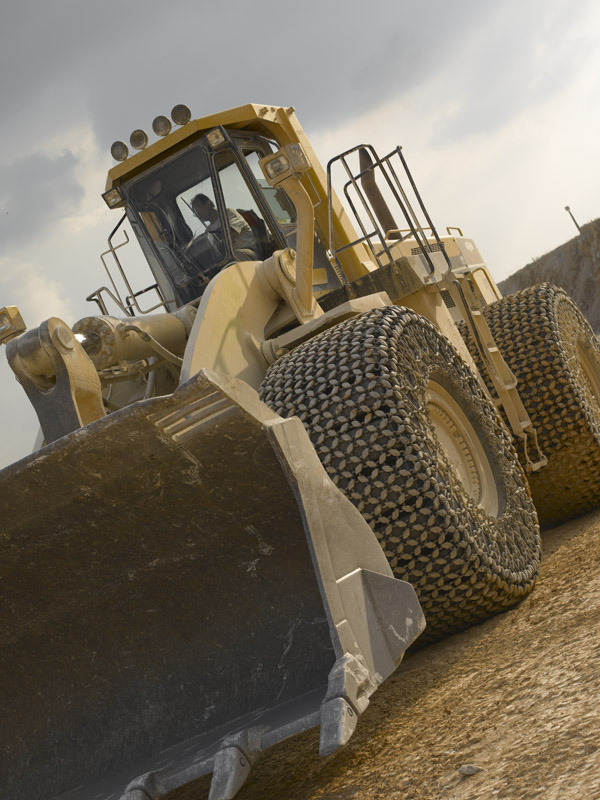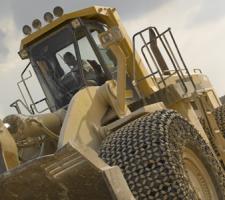
Tyre shortages have been a serious issue for quarry operators for some time and with no quick fix on the horizon, fitting of tyre protection chains could provide the answer
While some operators are fitting the next best size, others are running treads down to minus 5% or paying up to €1500 to repair damaged tyres. But tyre protection chains (TPCs) - originally developed to enable pneumatic tyres to be used in quarries - could provide a more cost effective solution.
TPCs are a close chain mesh which is fitted over the face and the sidewalls of the tyre to form a barrier against damaging materials. In addition to providing protection, these chains can also improve traction, especially at a quarry face where the working surface is covered in sharp-edged loose rock. In these conditions the performance of a wheeled loader can be considerably enhanced by the use of chains.
While the financial benefits of TPCs will vary from site to site, field trials by Germany-based
Before the trial, the wheeled loader was running on 36/65-33 DT's, which had an average service life of 1200 hours, with a cost of €27,500 per set or €27.91 every hour. The quarry operator invested €41,000 in fitting a set of Rud-Erlau Fels Royals X16 TPCs on the machine, extending tyre service life to 12000 hours and reducing tyre costs to €2.79 per hour.
According to Rud-Erlau, if the TPCs have a minimum service life of 10,000 hours (€4.10 per hour), the total hourly tyre costs for the wheeled loader will drop to €6.89 - a saving of 72%.
Productivity also showed significant improvements - with loaded volumes increasing by 16% from 550 to 630tonnes per hour. During the field tests downtime from tyre repairs fell from 160hours in the previous year to 36 hours per year for chain servicing, which increased the loader's availability.
TPCs were first developed as an adaptation of its snow chain technology to prevent rapid deterioration of tyres on quarry machines from abrasion and penetration by sharp rocks. Until development of TPCs, tyre problems made wheeled loaders an expensive luxury for quarrying and not an option for more demanding hard-rock mining environments.
Although TPCs are still used in quarries around the world, they were considered mainly applicable for conditions where poor traction, high abrasion or tyre piercing rocks were serious problems. However, recent tyre shortages have placed TPCs back in the spotlight.
According to Rud-Erlau, TPCs can help overcome traction and manoeuvrability problems. Open-mesh TPCs grip the road surface, ensuring sure-footed operation and eliminating danger to personnel and property and reducing driver fatigue. In dry conditions TPCs offer varying degrees of protection to match the environment.
The company also said, equipment carrying out stockpiling operations may benefit from being fitted with an open-mesh ring system. While close-meshed, case-hardened TPCs with full side wall protection enable loaders of all sizes to go operate in extreme mining conditions. In fact, some machines fitted with such TPCs can be used safely on flaming hot and cold steel slag.
Rud-Erlau claims that opting for TPCs could offer a better solution for quarry operators to the current tyre shortages than paying the high cost of new tyres or repairing old ones. Although TPCs need to be inspected and adjustments made to the chain tensioning, Rud-Erlau believe that using TPCs gives quarries a more competitive edge by ensuring maximum availability.















